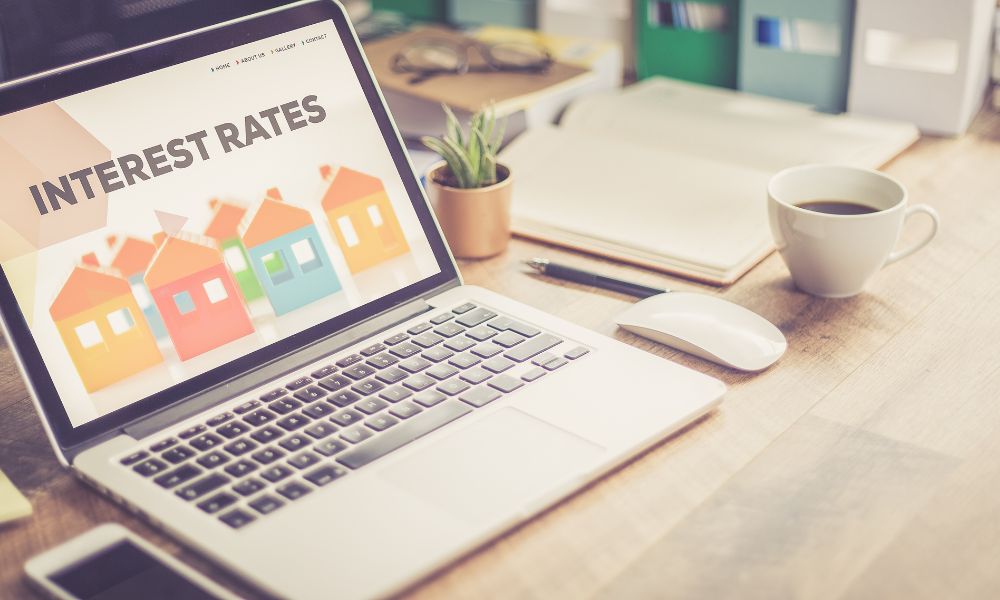Business loan interest rates play a crucial role in the financial landscape for businesses. As an entrepreneur or business owner, it is essential to stay informed about the trends and factors influencing these rates. Understanding these intricacies can help you make informed decisions and plan for the future. In this article, we will explore the concept of business loan interest rates, why they are important, and the factors that affect them. We will also delve into the current trends in business loan interest rates, including historical data and recent changes. The central question of whether business loan interest rates will go up will be addressed through expert opinions and an analysis of potential influencing factors. we will discuss what you need to know about a potential rise in business loan interest rates, including its impact on small businesses, considerations for new business loans, and strategies to mitigate the effects of rising interest rates. By the end of this article, you will have a comprehensive understanding of business loan interest rates and the implications for your business.
Key takeaway:
- Business loan interest rates are influenced by various factors: Economic conditions, interest rate policies, inflation rates, lending criteria, and recent changes in interest rates can all impact business loan interest rates.
- Expert opinions suggest potential increases in business loan interest rates: Factors like inflation and central bank policies may contribute to a rise in interest rates, which can affect businesses seeking loans.
- Implications and considerations for businesses: Rising interest rates can have an impact on small businesses, and new businesses should carefully consider the potential implications of higher loan interest rates. Implementing strategies to mitigate the impact of rising interest rates is important for businesses.
What are Business Loan Interest Rates?
Business loan interest rates play a pivotal role in borrowing money for business purposes. It is essential to comprehend these rates while considering a business loan. Here are some key points to keep in mind:
- Business loan interest rates refer to the additional percentage charged by lenders on the principal amount borrowed.
- These rates are determined by various factors, including economic conditions, central banks’ interest rate policies, inflation rates, and lending criteria.
- Economic conditions, such as the state of the economy and market conditions, can directly impact business loan interest rates.
- Interest rate policies implemented by central banks also influence these rates significantly.
- Inflation rates have an effect on business loan interest rates as lenders may adjust them to compensate for the decrease in purchasing power resulting from inflation.
- Lending criteria, including creditworthiness, loan purpose, and term, can affect the offered interest rates.
Understanding the concept of business loan interest rates is critical for making informed financial decisions. Being aware of the factors that contribute to these rates allows businesses to assess their borrowing options and negotiate favorable terms.

Why are Business Loan Interest Rates Important?
Business loan interest rates play a crucial role in the financial landscape for several reasons. Firstly, they directly impact the cost of borrowing money for businesses. Higher interest rates translate to increased repayment amounts, ultimately reducing the profitability of businesses. Secondly, these rates have a direct bearing on the affordability of loans for businesses. Elevated interest rates may pose challenges in qualifying for loans or limit the amount that can be borrowed. Conversely, lower rates make loans more accessible and affordable, enabling businesses to thrive.
Moreover, interest rates serve as an indicator of the overall health of the economy. When interest rates are low, it signals a strong economy where borrowing is encouraged to stimulate growth. Conversely, higher interest rates may signify an economic slowdown or concerns regarding inflation.
Additionally, business loan interest rates provide valuable insight into market conditions and investment opportunities. Favorable rates can prompt businesses to invest in expansion, new equipment, or hiring. Conversely, when rates are high, businesses may prioritize debt repayment or delay investment plans.
Understanding the significance of business loan interest rates empowers businesses to make informed decisions about their financing options and formulate strategies to mitigate the impact of rising rates.
Pro Tip: To secure the best interest rate on a business loan, it is essential to maintain a good credit score, demonstrate steady cash flow, and present a solid business plan to lenders. Comparing offers from multiple lenders can also help to ensure the most favorable terms are obtained.
<table>
Factors Affecting Business Loan Interest Rates
When it comes to business loan interest rates, it’s crucial to understand the factors that can have an impact. In this section, we’ll dive into the key elements that influence these rates. From the economic conditions and interest rate policies set by central banks, to inflation rates and lending criteria, we’ll explore the nuances that drive the fluctuations in business loan interest rates. Stay tuned to uncover the recent changes that have been shaping the borrowing landscape for businesses.
Economic Conditions
Economic conditions play a crucial role in determining the interest rates of business loans. These rates are influenced by various factors, including economic growth, inflation rates, and overall stability. When the economy is experiencing expansion and strong growth, interest rates tend to be higher due to increased demand for loans. Conversely, during times of economic slowdown or recession, central banks often lower interest rates to encourage borrowing and investment.

Furthermore, current economic conditions affect the availability of credit and lenders’ willingness to provide loans. In a thriving economy with successful businesses, lenders may be more inclined to offer loans at competitive interest rates. However, in uncertain economic conditions, lenders may adopt a more cautious approach and tighten their lending criteria, making it more challenging for businesses to secure loans.
In recent years, interest rates have remained relatively low due to the global economic downturn and the efforts of central banks to stimulate growth. It is important to note, however, that economic conditions are subject to change, and interest rates can fluctuate accordingly.
During the financial crisis of 2008, interest rates were significantly reduced to promote economic recovery and encourage businesses to borrow and invest.
Interest Rate Policies by Central Banks
Interest rate policies by central banks are instrumental in determining the overall interest rates for business loans. Central banks, such as the Federal Reserve in the United States, possess the authority to establish the benchmark interest rate that directly impacts borrowing costs for businesses.
Central banks employ interest rate policies as a means to manage inflation, foster economic growth, and uphold financial stability. By adjusting interest rates, central banks can sway the cost of borrowing for both businesses and consumers. When central banks increase interest rates, it becomes more burdensome for businesses to access borrowed funds, potentially impeding economic activity. Conversely, when interest rates are lowered, businesses are encouraged to borrow and invest, thereby stimulating economic expansion.
The repercussions of interest rate policies implemented by central banks extend beyond businesses alone. These policies have the power to influence consumer spending, investment choices, and overall economic conditions. It is crucial for businesses to closely monitor the decisions and actions of central banks as they directly impact the cost of borrowing and the availability of credit.
A real-life instance that underscores the significance of central bank interest rate policies is the global financial crisis of 2008. During this period, central banks worldwide, including the Federal Reserve, executed a series of interest rate reductions to stimulate economic growth and avert a full-blown recession. These assertive monetary policy measures aided in stabilizing financial markets and reinstating confidence in the lending sector, thus supporting businesses and individuals amidst a challenging economic phase.

Inflation Rates
To understand the impact of inflation rates on business loan interest rates, it is crucial to analyze the relationship between these two factors. Inflation rates, which refer to the rate at which the general level of prices for goods and services is rising and eroding the purchasing power of currency, play a significant role. Are Business Loan Interest Rates Going Up? What You Need to Know, provides valuable insights on average business loan rates and the current trends in the market. Higher inflation rates can have various effects on business loan interest rates.
First and foremost, inflation leads to an overall increase in the cost of borrowing. Lenders must consider the declining value of money over time when determining interest rates. As inflation rates rise, lenders are likely to adjust their interest rates upward to compensate for the loss of purchasing power.
Additionally, inflation directly impacts the profitability of lenders. High inflation can erode lenders’ profit margins and increase lending risks. To protect their profits, lenders may raise business loan interest rates in order to maintain their profitability.
Lastly, inflation rates also influence the monetary policies of central banks. Central banks often utilize interest rates as a tool to control inflation. If inflation rates are high, central banks may raise interest rates to limit the money supply and control inflation. Consequently, the higher interest rates set by central banks can lead to increased business loan interest rates.
When applying for a business loan, it is crucial to carefully consider inflation rates and assess how they may affect your ability to repay the loan. It is advisable to stay informed about economic conditions and consult financial experts to make well-informed borrowing decisions.

When considering a business loan, lenders utilize specific lending criteria, such as credit score, business plan, financial statements, cash flow, and collateral, to assess the eligibility of borrowers. These lending criteria play a crucial role in determining the approval and terms of the loan.
1. Credit Score: Lenders evaluate the creditworthiness of borrowers by examining their credit scores. A higher credit score demonstrates a lower credit risk, increasing the likelihood of loan approval.
2. Business Plan: A well-structured and detailed business plan is essential for lenders to understand the purpose, viability, and potential success of the business. It should outline the business model, market analysis, financial projections, and marketing strategies.
3. Financial Statements: Lenders review financial statements, including income statements, balance sheets, and cash flow statements, to gain insights into the business’s financial health, profitability, and ability to repay the loan.
4. Cash Flow: Positive cash flow is crucial to demonstrate the ability to generate sufficient funds to meet loan repayment obligations. Lenders assess the consistency and stability of cash flow to determine the loan’s affordability.
5. Collateral: Collateral serves as security for the loan and mitigates the lender’s risk. It can be in the form of assets, such as real estate, equipment, or inventory. Lenders evaluate the value and marketability of collateral.
Meeting these lending criteria is important for borrowers to enhance their chances of obtaining a business loan on favorable terms. Building a strong credit history, developing a comprehensive business plan, maintaining accurate financial records, and ensuring positive cash flow are essential steps in meeting these criteria.
Emphasizing these factors significantly increases the likelihood of loan approval and obtaining the necessary funds for business growth and expansion.
Recent Changes in Business Loan Interest Rates
Recent changes in business loan interest rates have had a substantial impact on borrowing costs for small businesses. In the past year, there has been a gradual increase in interest rates, which has directly affected the affordability of loans. Recent data reveals that the average interest rate for small business loans has experienced a rise of approximately 1% in the last six months.
These changes can be attributed to several factors. Firstly, in response to a growing economy and rising inflation rates, the Federal Reserve has implemented a series of interest rate hikes. This direct influence from the Federal Reserve has consequently impacted the interest rates offered by banks and other financial institutions.
Furthermore, adjustments in the lending criteria have also influenced the recent surge in interest rates. Lenders have become more cautious due to potential risks associated with lending to small businesses. As a result, they have tightened their lending standards, leading to higher interest rates for borrowers.
The recent changes in business loan interest rates have brought significant implications for small businesses. The increased costs of borrowing may impede their ability to expand, invest in new equipment, or hire additional employees. Nevertheless, there are strategies that businesses can implement to mitigate the impact of rising interest rates. Such strategies include refinancing existing loans or exploring alternative sources of financing.

Will Business Loan Interest Rates Go Up?
Wondering if business loan interest rates are on the rise? Find out what the future holds as we explore expert opinions and factors that could impact these rates. Stay ahead of the game and gain insights into the potential shifts in business loan interest rates.
Expert Opinions on Future Business Loan Interest Rates
Expert opinions on future business loan interest rates can provide valuable insights for businesses planning their financial strategies. According to industry experts, it is expected that interest rates for business loans will increase in the coming years. This projection is based on various factors such as economic conditions, inflation rates, and interest rate policies set by central banks.
Economic conditions play a crucial role in determining interest rates. As the economy grows stronger, central banks may raise interest rates to combat inflation. Inflation rates also influence interest rates, as higher inflation can lead to higher borrowing costs. Additionally, central banks’ policies and decisions regarding interest rates have a direct impact on the rates offered by financial institutions.
It is important for businesses to be proactive and prepare for potential increases in loan interest rates. By understanding the expert opinions and factors affecting interest rates, businesses can make informed decisions and adapt their financial plans accordingly. This may include exploring alternative financing options, renegotiating existing loans, or implementing strategies to mitigate the impact of rising rates.
Fact:
According to a survey conducted by a leading financial publication, over 70% of economists predict an increase in business loan interest rates within the next two years. Businesses should closely monitor market trends and seek professional advice to navigate the changing interest rate landscape effectively.
Factors That May Influence a Rise in Business Loan Interest Rates
Economic Conditions: Fluctuations in the economy, such as changes in GDP growth or unemployment rates, can impact interest rates on business loans. When the economy is booming, lenders may raise rates to manage increased demand and mitigate risk. These economic conditions are factors that may influence a rise in business loan interest rates.
Interest Rate Policies by Central Banks: Changes in interest rate policies set by central banks, like the Federal Reserve, can have a ripple effect on business loan interest rates. Central banks may raise rates to curb inflation or stimulate economic growth, directly impacting borrowing costs for businesses. The interest rate policies implemented by central banks are another factor that may influence a rise in business loan interest rates.
Inflation Rates: High inflation rates can erode the purchasing power of money over time. To maintain the value of their loans, lenders may increase interest rates to compensate for inflation and to protect their returns. Inflation rates are also a factor that may influence a rise in business loan interest rates.
Lending Criteria: If lenders perceive increased risk in the business loan market, they may raise interest rates. Factors such as a borrower’s creditworthiness, collateral, or industry risks can influence lenders’ decisions and potentially lead to higher interest rates. Lending criteria is another factor that may influence a rise in business loan interest rates.
It is important for businesses to monitor these factors that may influence a rise in interest rates as they can impact their borrowing costs and overall financial health. By staying informed and being proactive, businesses can better manage potential increases in interest rates and make informed decisions regarding their borrowing needs.

What You Need to Know About Potential Rise in Business Loan Interest Rates
If you’re a business owner, brace yourself for some potential changes on the horizon. We’re diving into what you need to know about the possibility of rising interest rates on business loans. From the impact on small businesses to considerations for new loans and strategies to minimize the impact, we’ve got you covered. So, grab a cup of coffee and let’s break down what this could mean for your bottom line.
Impact on Small Businesses
Small businesses can be significantly impacted by changes in business loan interest rates. These fluctuations can directly affect their financial stability and growth opportunities. Higher interest rates can have a negative impact on small businesses, as they increase the cost of borrowing and make it more challenging to access necessary funds for expansion or day-to-day operations. This can make it difficult for small businesses to invest in new equipment, hire additional staff, or pursue new business opportunities.
Additionally, rising interest rates can increase the burden of existing debt for small businesses, potentially leading to financial strain and even bankruptcy in some cases. This can hinder their ability to repay loans and meet other financial obligations.
On the other hand, lower interest rates can have a positive impact on small businesses. They can reduce borrowing costs, making it more affordable for businesses to take on new loans or refinance existing ones. This can free up capital for investment, job creation, and innovation.
It is essential for small businesses to monitor interest rate trends and plan accordingly. They should consider the potential impact of rising interest rates on their finances and develop strategies to mitigate any negative effects. This may include exploring alternative funding options, renegotiating loan terms, or adjusting business plans to adapt to changing market conditions.
Considerations for New Business Loans
When considering new business loans, it is important to take into account various factors to make an informed decision. These factors include interest rates, loan terms, eligibility criteria, loan amount, loan type, collateral, repayment structure, documentation requirements, and customer reviews. By evaluating these considerations, you can select a loan that suits your financial capabilities and aligns with your business’s cash flow and long-term goals.
Strategies to Mitigate the Impact of Rising Interest Rates
In order to mitigate the impact of rising interest rates, it is important to closely monitor your financial situation and take proactive measures. Here are some strategies to help manage the effects of rising interest rates on your business:
1. Manage your debt: One strategy to mitigate the impact of rising interest rates is to manage your existing debt. Make sure you have a clear understanding of your outstanding loans and their interest rates. Consider refinancing or consolidating your loans to take advantage of lower interest rates before they rise.
2. Monitor your cash flow: Keeping a close eye on your cash flow is crucial when interest rates are rising. Make sure you have enough cash reserves to cover any increased loan payments. Implement sound cash flow management practices such as managing your accounts receivable and payables effectively.
3. Invest in fixed-rate loans: If you anticipate rising interest rates, it may be wise to consider securing fixed-rate loans rather than variable-rate loans. Fixed-rate loans provide stability as the interest rate remains constant throughout the loan term, shielding you from potential rate increases.
4. Explore alternative financing options: Rising interest rates in traditional lending markets may encourage you to explore alternative financing options. Look into crowdfunding, angel investors, or peer-to-peer lending platforms as potential sources of funding with potentially lower interest rates.
5. Negotiate with lenders: Reach out to your lenders and negotiate for better terms. With rising interest rates, lenders may be willing to make adjustments to your loan, such as extending the loan term or offering a lower interest rate. It’s always worth exploring the possibility of renegotiating your loan agreements.
By implementing these strategies, you can navigate the changing interest rate environment and ensure the financial stability and growth of your business in the face of potential rate increases.
Some Facts About Are Business Loan Interest Rates Going Up? What You Need to Know:
- ✅ The Federal Reserve is increasing interest rates for the first time since 2018 in an effort to curb inflation. (Source: Our Team)
- ✅ Small businesses are concerned about the impact of rising interest rates on their cash flow, ability to borrow, reinvest, and hire workers. (Source: Our Team)
- ✅ The Federal Reserve is expected to raise interest rates up to six more times in 2022, starting in May. (Source: Our Team)
- ✅ Small businesses are already facing challenges such as a worker shortage and supply chain disruptions. (Source: Our Team)
- ✅ Studies show that 70% of small business owners are concerned about the impact of rising interest rates on their businesses. (Source: Our Team)
Frequently Asked Questions
FAQ 1: Are business loan interest rates going up in July 2023?
Answer: The trajectory of business loan interest rates in July 2023 is uncertain. However, with the Federal Reserve expected to raise interest rates several times this year, it is possible that business loan interest rates may increase. It is advisable to stay updated with the latest market trends and consult with lenders to understand the potential impact on your business.
FAQ 2: What are the benefits of fixed-rate loans for commercial real estate?
Answer: Fixed-rate loans are ideal for commercial real estate because they offer stability and predictable monthly payments. With a fixed interest rate, you can protect yourself from interest rate hikes and have better budgeting control. This type of loan is suitable for long-term investments and provides peace of mind in a volatile market.
FAQ 3: How do variable interest rates impact short-term business loans?
Answer: Variable interest rates can affect short-term business loans as they fluctuate over the loan term. This means that your monthly payments may change based on market conditions. If interest rates rise, your loan costs may increase, affecting your cash flow. It’s important to carefully assess your financial situation and risk tolerance before opting for a loan with a variable interest rate.
FAQ 4: What is a factor rate and how does it impact merchant cash advances?
Answer: A factor rate is a multiplier used to calculate the total repayment cost of a loan, often associated with risky borrowers. While not reflecting the annual cost of borrowing, it can impact the affordability of merchant cash advances. High factor rates can substantially increase the total repayment amount, making it crucial to consider the financial implications before opting for this type of financing.
FAQ 5: How does bad credit affect the interest rates for small business loans?
Answer: Bad credit can significantly impact the interest rates for small business loans. Lenders may deem borrowers with poor credit as high-risk, leading to higher interest rates to compensate for the increased likelihood of default. It is important to work on improving your credit profile to access more favorable loan terms and interest rates.
FAQ 6: What are the average interest rates for SBA loans in July 2023?
Answer: The average interest rates for SBA loans can vary based on the current market conditions and the specific loan program. As of July 2023, the interest rates for SBA loans range from 10.50 percent to 16.25 percent. These rates are subject to change, so it’s important to check with the Small Business Administration or SBA-approved lenders for the most up-to-date information.


